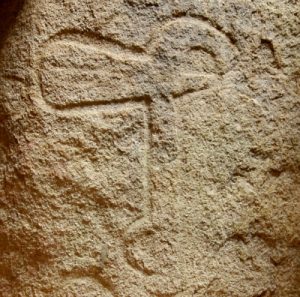Axe Carving
The stone axe had an important role as tool and weapon in the Neolithic.

Locations
As a symbol stone axes are found as carvings in several passage tombs in Brittany. Hafted axes are found for example in: Mané Kerioned, Kerran, Mané Lud, La Table des Marchands, Manio and others.
In Britain carved axes on Megalithic structures are rare and only two places are known: the central stone of the Boscawen-ûn stone circle in Cornwall and the carvings in Stonehenge.

Interpretation
Shee Twohig [1] argues that axe carvings in Breton tombs are often found together with bow carvings in the antechamber and could have had a kind of guardian function.
Moreover the stone axe was certainly also a symbol of power and so the carvings.
References
[Bibtex]
@Book{Twohig1981,
author = {Twohig, Elizabeth},
publisher = {Clarendon Press Oxford University Press},
title = {The megalithic art of Western Europe},
year = {1981},
address = {Oxford New York},
isbn = {0-19-813193-3},
}